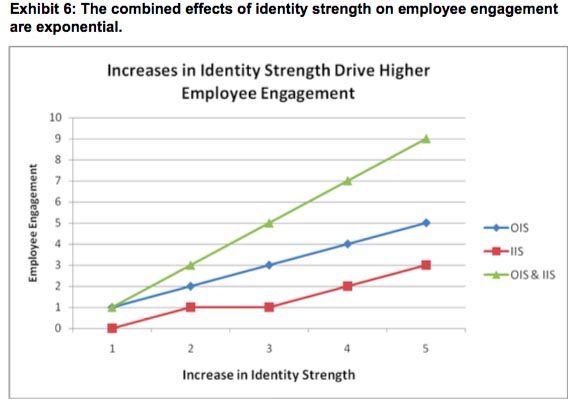Resources
Employee EngagementHow Identity-Based Management Drives Employee Engagement and Business Performance
How Identity-Based Management Drives Employee Engagement and Business Performance
By Larry Ackerman
The idea that a company benefits from having a strong sense of identity is not a new one, but is still open to debate. We undertook this study to determine whether identity strength really matters and, if so, how.
Our belief is that companies with strong identities should fare better than those that lack this fundamental asset. To test this hypothesis quantitatively we conducted the Identity Impact Survey with the aim of assessing whether identity strength influences employee engagement and therefore business performance.
The Survey included nearly 2,000 respondents across five companies in various industries:
•Global Vision Care — $60 million in revenues
•Regional health insurance and managed care — $8 billion in revenues
•Global industrial manufacturing —$5 billion in revenues
•Internet media — $55 million in revenues
•Institutional food services — $500 million in revenues
KEY FINDINGS:
The Survey found that the correlations between identity strength, employee engagement, and business performance were very high. In short, when it comes to spurring growth, identity and the discipline of identity-based management are the cornerstones of value creation.
Our key findings were:
•Identity strength is a leading indicator of business performance, given its significant, positive impact on employee engagement.
•Increases in identity strength translate into predictable increases in revenue and other economic benefits.
•Organizational identity strength is more influential than individual identity strength in driving employee engagement and business performance.Their combined effect, however, is greater than either one alone.
•When it comes to employee engagement, identity strength is a pre-condition to engagement that transcends specific workplace practices.
•Although organizational identity emerges as a prime performance driver, people don’t typically think that their organization actually has a strong identity.
FIVE IMPERATIVES:
Here are five management imperatives. Answering them will help increase the performance, impact, and reputation of any organization.
1. Integrate identity and economics
Identity provides the human model of how companies work, just as economics provides the capital model. Blending the disciplines of business economics and identity-based management into a mutually supportive discipline gives executives a more comprehensive and reliable framework for shaping strategy, managing operations, and measuring results.
2. Lead through identity
In the search for effective ways to lead organizations, leaders should capitalize on the power of identity to build support, internally and externally, that is based upon three crucial needs: the need for authenticity, integrity, and endurance. These are the natural results of identity-based management, which gives leaders the foundation they need to maximize value creation.
3. Close the value gap
Most companies are operating way below their capacity to create value, and the aggregate losses in productivity and profits are extraordinary. Closing this “value gap” would not only improve corporate performance, but would go a long way toward increasing any nation’s overall economic vitality.
4. Let identity drive culture
Because of its pervasive presence and impact, identity is a natural “forcing function” for shaping a culture around the dynamics of value creation. What lends identity its “gravitational” power is that it automatically aligns the deepest needs of an organization with the deepest needs of individuals: the need to create value and be rewarded for it in return.
5. Make identity the cornerstone of employee engagement
In the war for talent, identity is the magnet. High levels of employee engagement correlate in dramatic and positive ways with organizational identity strength, followed notably by individual identity strength. All of the workplace practices in the world, no matter how effective or innovative, cannot substitute for identity strength, which is fundamental to the healthy functioning of companies and individuals alike.
The opportunities inherent in identity-based management run broad and deep. Capitalizing on them is a leadership challenge for the 21stcentury.

